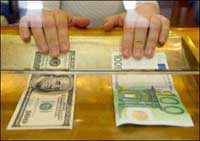Dollar falls below 110 yen in Asian trading for the first time in a year
The dollar fell below 110 yen for the first time in a year and a half during Asian trade Monday, as Japanese retail investors pulled out of overseas assets and Asian stock markets plummeted.

The greenback hit 109.85 yen during Monday trade, its lowest since it marked 108.89 yen May 17, 2006. The Japanese currency was trading at 110.34 yen midafternoon, down from 111.07 yen late Friday in New York.
The euro fell to US$1.4634 from US$1.4673.
Renewed concerns over credit markets after major U.S. banks wrote-down assets linked to troubled subprime mortgages were a major force behind the yen-buying and the broad sell-off in Asian stock markets, traders said.
Signs of tolerance for a strong yen among Tokyo policymakers supported the Japanese currency as well, they said.
Japanese Chief Cabinet Secretary Nobutaka Machimura said at a regular press conference Monday morning that a strong yen is "basically good" as it means Japan is valued more highly internationally.
Japan's Finance Minister Fukushiro Nukaga told reporters separately he will closely examine exchange rates and stock markets movements, but he didn't ring any alarm bells about a rising yen.
"This is a bad situation for the dollar," said Satoshi Okagawa, head of the foreign exchange forward trading group at Sumitomo Mitsui Banking Corp. Because of the gloomy outlook for the U.S. economy, "sentiment toward the dollar is weak," he said.
Relatively thin market conditions, due to a U.S. holiday Monday, exaggerated the impact of the yen-buying, traders said. The U.S. bond market will be closed Monday for observance of Veterans Day; the stock market will be open.
Japanese retail investors, who trade currencies on margin, aggressively bought back the yen they had previously sold for the dollar, the euro and other higher-yielding currencies, probably in an attempt to minimize losses after their currency's recent surges, traders said.
Japanese securities companies also sold the dollar and other currencies, probably on behalf of domestic investors offloading overseas bonds, other traders said.
Japan's benchmark Nikkei 225 average dropped below the 15,000 mark for the first time since July 27, 2006, leading U.S. and European players to buy the yen, traders said. The Nikkei closed the day's session at 15,197.09 points, down 2.48 percent from Friday.
Against other regional currencies, the dollar was mostly higher, rising to 7.7845 Hong Kong dollars from 7.7822 the previous day, and to 910.9 South Korean won from 907.0. It also rose to 43.080 Philippine pesos from 42.600.
Subscribe to Pravda.Ru Telegram channel, Facebook, RSS!


